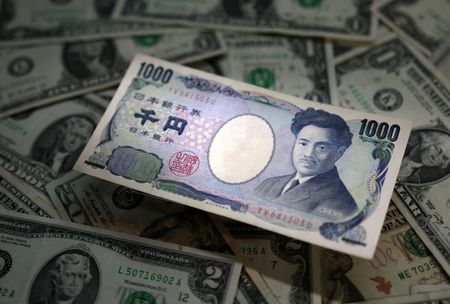

By Rae Wee and Joice Alves
SINGAPORE/LONDON (Reuters) – The Japanese yen fell to a nine-year low against the euro on Friday after the Bank of Japan (BOJ) left its ultra-easy monetary policy unchanged even as it scrapped a pledge to keep interest rates low.
The euro briefly rose to its highest level against the yen since December 2014 at 149.50. It was last up 1% at 148.98 yen with expectations the European Central Bank (ECB) will hike rates again next week also supporting the single currency.
The outcome of new BOJ Governor Kazuo Ueda’s first policy meeting was closely watched. As expected, the BOJ said it would maintain ultra-low interest rates, and unanimously decided to make no changes to its yield curve control (YCC) policy.
However, the central bank removed a pledge to keep interest rates at “current or lower levels” and said it would “conduct a broad-perspective review of monetary policy”.
That review is expected to last around one to one-and-a-half years and would lay the groundwork for Ueda to gradually phase out his predecessor’s massive stimulus programme.
The yen fell sharply also against the U.S. dollar, down 1.3% to 135.78, its lowest since March 10.
“The hopes of a policy change has been somewhat dampened by the review,” said Moh Siong Sim, a currency strategist at Bank of Singapore, adding that the likely length of the review might have cooled hopes of an imminent move in the policy setting.
“For now, the outcome is read as a dovish outcome.”
On Friday, however, government data showed core consumer prices in Japan’s capital, Tokyo, rose 3.5% in April from a year earlier, beating market forecasts in a sign of broadening inflationary pressure in the world’s third-largest economy.
“This puts pressure on the BOJ, they might do something in the near future,” said Tina Teng, market analyst at CMC Markets.
Elsewhere, the euro fell 0.4% to $1.10986, but remained near its recent one-year high, after German first quarter growth came in weaker than expected. Bloc-wide GDP figures are due at 0900 GMT.
The common currency was eyeing a monthly gain of more than 1.3% buoyed by expectations that the ECB still has further to go in raising interest rates, analysts said.
The International Monetary Fund called on the ECB on Friday to keep raising interest rates until the middle of 2024 and on European Union finance ministers to tighten fiscal policy, in concerted action to bring down high inflation.
“Investors favour currencies that can offer both an ongoing domestic tightening cycle and still some room for a hawkish surprise at the coming meetings,” said ING analysts.
“In that sense, the euro is one of the very few currencies that can offer this combination at the moment.”
In the wider currency market, the U.S. dollar rose broadly on Friday, drawing support from data pointing to still-sticky inflation in the United States, which reinforced expectations for a 25-basis-point rate hike at next week’s FOMC meeting..
The U.S. dollar index gained 0.5% to 101.93, rebounding from a near two-week low struck on Wednesday.
However, the index remained on track for a monthly loss of close to 0.8%, after having fallen about 2.3% in March.
Data released on Thursday showed that while U.S. economic growth slowed more than expected in the first quarter, consumer spending, which was accompanied by a rise in inflation, accelerated.
“The Fed is widely expected to hike again next week but with inflation remaining sticky, we expect the Fed to stay on hold for the remainder of the year, dashing hopes of a policy pivot in (the second half),” said analysts at Societe Generale.
(Reporting by Rae Wee in Singapore and Joice Alves in London; Editing by Toby Chopra)

